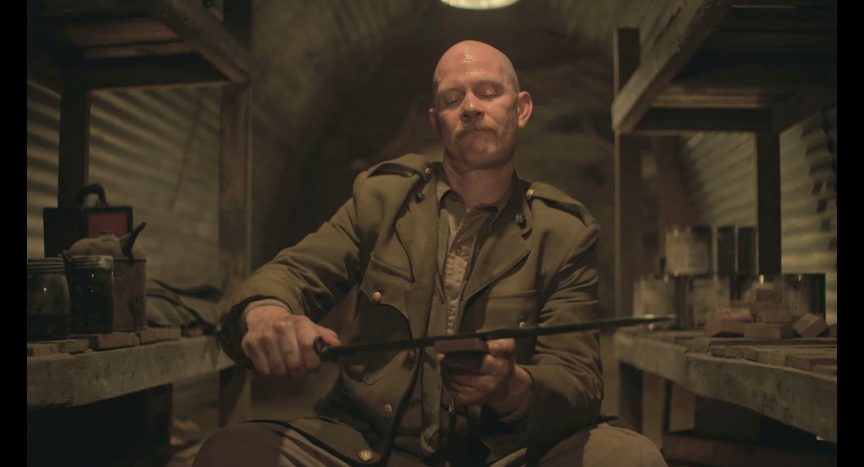In director Adrian Langley’s new WWI-set Bunker, an exhausted battalion of soldiers–some British, some American–find themselves presented with a rare opportunity. From the grimy trench they call home, the battalion’s lookout discovers that their enemy’s own trench has been abandoned. Suspecting a retreat, the Allied soldiers make their way across the wastes of No-Man’s-Land to take over the deserted German stronghold.
Also See: Consecrations is Thoughtful, Visually Appealing Religious Horror
Upon entering the titular bunker, they find a young German soldier hung up and nailed to the wooden crossbeams like some haphazard approximation of the crucifix. The German youth is alive, and the soldiers save him from his disturbing fate, but find the man nearly mute.
Things begin to unravel when a shell strikes the bunker, leaving the Allied battalion and their quarry trapped in the German bunker. Soon, the soldiers begin to descend into madness. Naturally, something hellish and supernatural is happening in this abandoned bunker, leading to an ever-escalating series of mental calamities and violence. All the while their prisoner of war looks on knowingly, doling out only tidbits of vaguely apocalyptic-sounding information.
Also See: 10 of the Most Chilling Settings in Horror
The WWI period setting is a welcome and novel twist on the well-worn “descent into madness” premise at the core of Bunker. The production value Langley achieves with the film’s relatively minor budget is impressive, too, and aided by the bottle-episode quality of its storytelling. Think classic Twilight Zone, with a touch of Howard Hawks’ Sergeant York.
Where Bunker stumbles is its pacing. Langley takes his sweet time meting out morsels and clues as to what exactly is lurking in the bunker alongside the trapped Allied soldiers. But what should amount to a pleasantly slow burn is instead overdrawn. Scenes linger too long, allowing the tension to seep out of the frame like air from a squeezed balloon.
The prolonged nature of every sequence highlights Bunker’s other major weakness–the massive inconsistency of its central performances. There’s an excess of shaky accent work combined with an oscillating character-to-character tonal variance. It’s a pity, because there’s an enjoyably stylized quality to the dialogue as written that recalls the heightened speechifying of the 1940s war pictures Langley is clearly riffing on.
When things finally kick into high gear in the third act, Bunker regains its footing. It’s the getting there that’s the issue. Langley is a real talent, though. There’s a genuine perspective and aesthetic craft that makes Bunker impossible to dismiss. And if it’s not an out-and-out success, it’s an excellent calling card for what the director could be capable of given a stronger script and a bit more budgetary freedom.
The flick is now playing in theaters.
